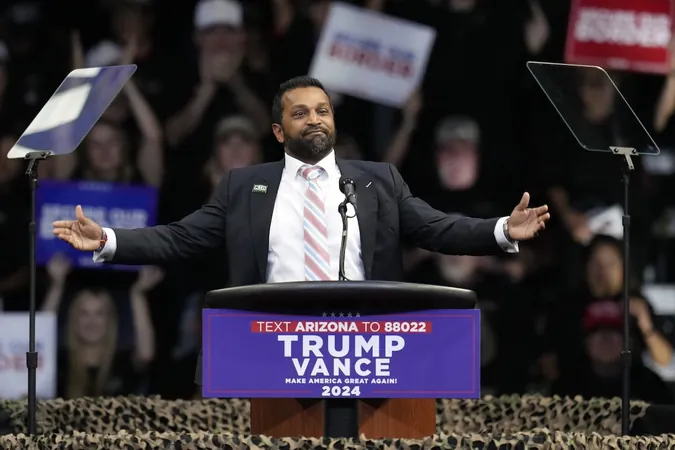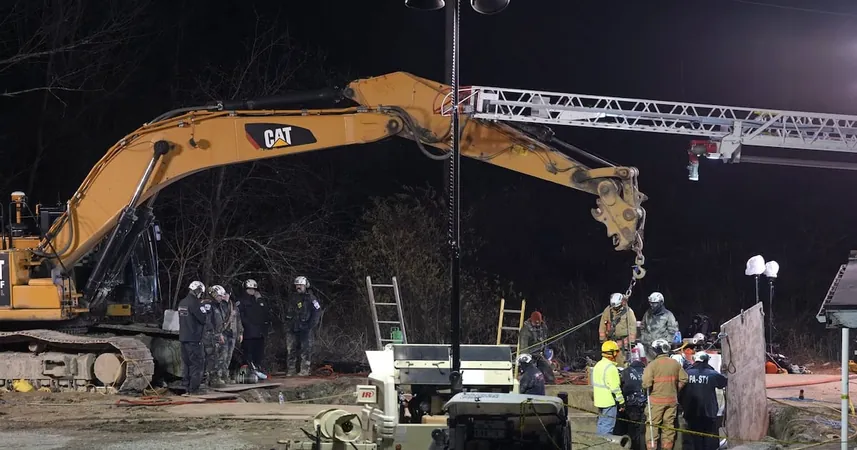
Inside Kash Patel’s Ambitious Vision to Overhaul the FBI: What You Need to Know!
2024-12-03
Author: William
Inside Kash Patel’s Ambitious Vision to Overhaul the FBI: What You Need to Know!
Kash Patel, a highly controversial figure within Donald Trump's inner circle, has been gaining significant attention since his nomination by the former president to lead the FBI. Known for his strong allegiance to Trump and skepticism towards the FBI and the broader intelligence community, Patel's ideas for reshaping the bureau have sparked fervent debate both publicly and in Congress.
As he prepares for what promises to be a contentious Senate confirmation hearing, Patel's proposals for the century-old FBI raise eyebrows. He has hinted at radical reforms that could redefine the agency's structure and mission, but many wonder how feasible these ideas truly are.
Shutting Down the Hoover Building?
One of Patel's most shocking suggestions involves shuttering the FBI’s historic headquarters—the J. Edgar Hoover Building—located on Pennsylvania Avenue. Patel has stated, “I’d shut down the FBI Hoover Building on day one and reopen it the next day as a museum of the 'deep state.'” This controversial statement reflects his vision of dispersing the workforce to engage more directly in community policing: “Go be cops—you’re cops; go be cops.”
While such a radical plan sounds appealing to some who criticize the FBI's alleged bureaucratic inefficiency, its implementation would undoubtedly face numerous legal and logistical challenges. In his book, *Government Gangsters: The Deep State, the Truth and the Battle for Our Democracy*, Patel mentions relocating the FBI headquarters to prevent what he describes as “institutional capture” by politics.
Targeting ‘Conspirators’ in Government and Media
Notably, Patel’s perspective extends to rooting out what he sees as conspirators within both the government and the media. In a 2022 interview, he claimed he would actively pursue individuals in the media who he believes perpetuated falsehoods during the election process. This approach raises significant concerns about potential overreach and the balance between national security and the freedom of the press.
Patel seems eager to change existing policies regarding press freedoms, possibly reversing protections that prohibit the Justice Department from seizing journalists' records during leak investigations—an issue that carries dramatic implications for civil liberties and freedom of the press.
Demanding Surveillance Reform
In addition, Patel has called for “major, major” reforms to the FBI’s surveillance practices, especially concerning the Foreign Intelligence Surveillance Act (FISA). Aligning himself with both civil libertarians and Trump’s base, he has criticized the misuse of surveillance authority while endorsing the need for a clearer framework that protects American citizens' rights.
Under his guidance, the FBI could experience a significant shift in how it manages intelligence-gathering, especially with the controversial Section 702 of FISA, which allows the collection of communications from non-Americans abroad. As President Biden signed a two-year extension of this authority, Patel's disdain for the decision highlights a broader debate on government surveillance practices.
The Future of the FBI: Consolidation or Division?
Finally, Patel’s ambition doesn’t stop with surveillance reform—he advocates for reducing the size of the intelligence community and potentially separating the FBI's intelligence operations from its law enforcement duties. His approach could fundamentally alter the bureau's operational framework, reflecting a growing tension between traditional intelligence-gathering and navigating contemporary threats posed by domestic and foreign adversaries.
Critics, including former FBI officials, argue that fragmenting the FBI’s capabilities could weaken its overall effectiveness in addressing a complex threat landscape. The changes Patel envisions could unravel decades of evolution aimed at transforming the agency into a formidable intelligence organization capable of addressing modern challenges.
As Patel prepares for his Senate confirmation, the outcome will not only determine the future direction of the FBI but may also set precedents for law enforcement and intelligence practices across the U.S.—a potential shift that could impact every citizen. Will Patel's bold plans successfully reshape the FBI, or will they face too many obstacles to become reality? The nation watches closely as this story unfolds.









 Brasil (PT)
Brasil (PT)
 Canada (EN)
Canada (EN)
 Chile (ES)
Chile (ES)
 España (ES)
España (ES)
 France (FR)
France (FR)
 Hong Kong (EN)
Hong Kong (EN)
 Italia (IT)
Italia (IT)
 日本 (JA)
日本 (JA)
 Magyarország (HU)
Magyarország (HU)
 Norge (NO)
Norge (NO)
 Polska (PL)
Polska (PL)
 Schweiz (DE)
Schweiz (DE)
 Singapore (EN)
Singapore (EN)
 Sverige (SV)
Sverige (SV)
 Suomi (FI)
Suomi (FI)
 Türkiye (TR)
Türkiye (TR)